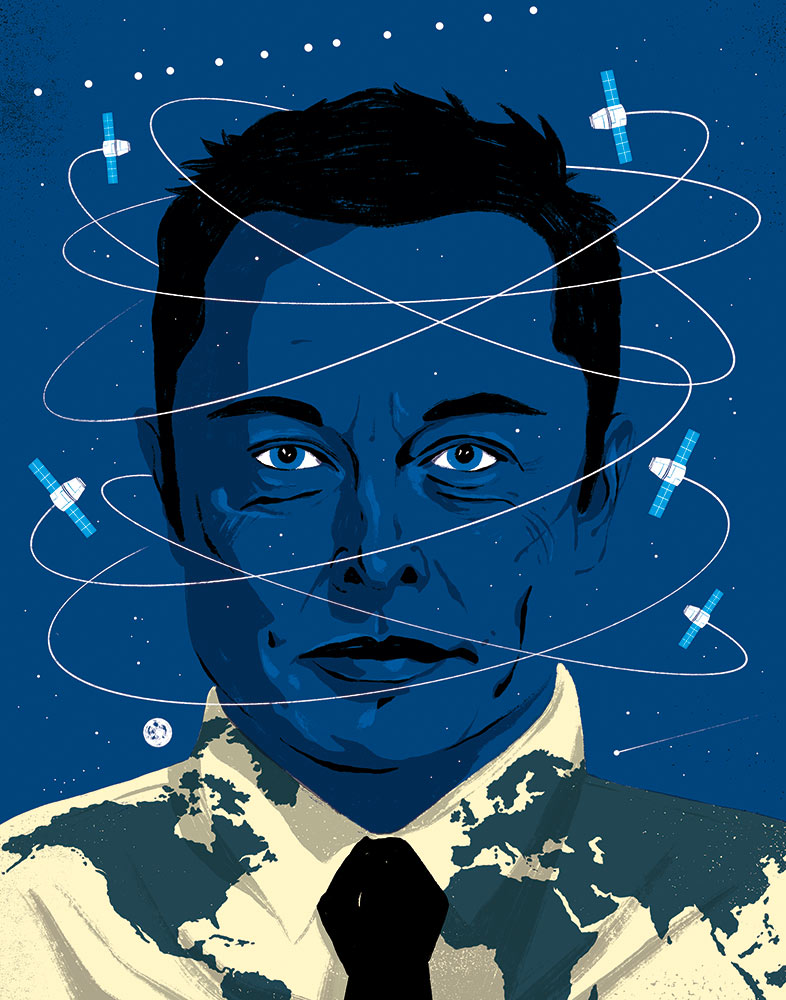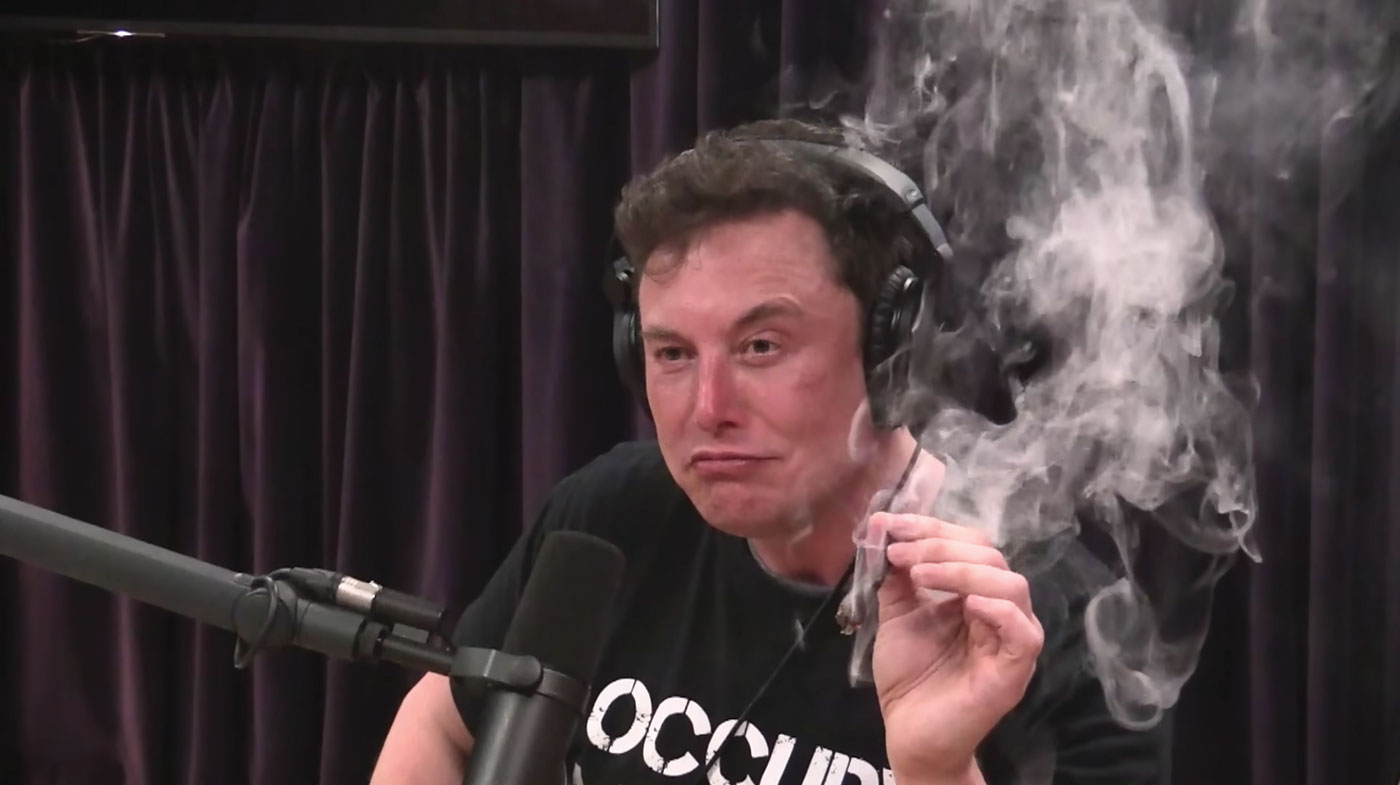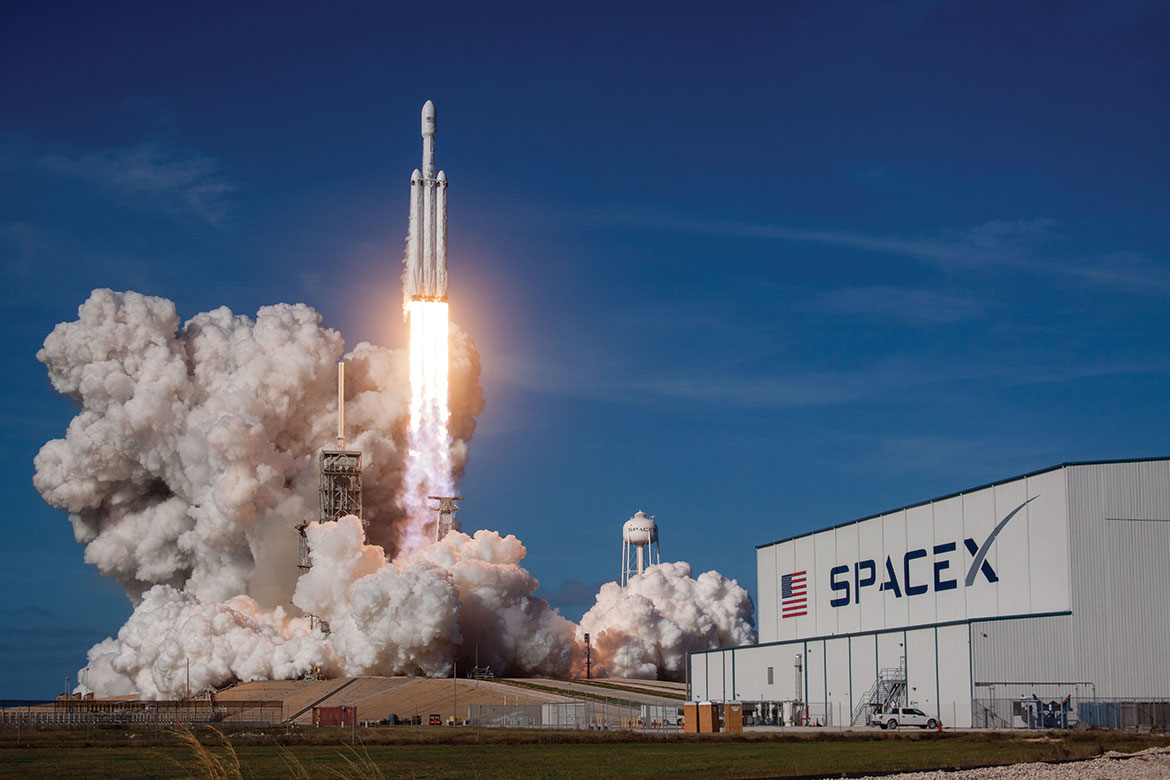Elon Musk’s Real Threat to Democracy Isn’t What You Think
How the attention-starved CEO took over our communications infrastructure.

Elon Musk used to be a car guy—an eccentric visionary, sort of quirky and absurd, but mostly entertaining. For some reason, a key group of people in and around Silicon Valley took him seriously, but he rarely exhibited the kind of depth or power that would concern anyone outside his core businesses.
Special Media Issue
Now Musk is a media mogul whose decisions cost lives and affect the world. He seems more absurd than ever, yet we can no longer afford to dismiss or ridicule him.
Musk is not a media mogul because he owns Twitter—now called X after Musk’s favorite letter. On the day he bought it in 2022, the platform had hardly ever cracked the top 10 most-used social media services in the world and was never able to make a significant profit. Yet Musk believed it was worth $44 billion.
Since then, Musk has clumsily and angrily dismantled the service, which once hosted many influential conversations among elites and served as a site for activism like #BlackLivesMatter and as an early-warning system that could flag breaking news and emergencies. For all the limitations and virtues of pre-Musk Twitter, almost none of its value remains after he drove away its most talented staff and the most valuable advertisers.
Musk is also not a media mogul because of his appeal to a corps of angry young men who wish that they, too, could sire progeny in the double digits without commitment or consequence and command the attention of a fawning and gullible business and celebrity press.
No, Musk is a central figure in the 21st century because he exercises an unusual new form of power over one of the most important resources in the communications ecosystem: satellite Internet connectivity. He can turn the digital tap on and off at will for millions of people. He can monitor the nature of Internet activity in sensitive places around the world if he chooses to—and has begun experimenting with that power in a host of troubling ways. And no one seems willing or able to hold him accountable.
Musk’s media power flows mainly from an early side project in his privately owned (but largely publicly funded) rocket-and-satellite company, SpaceX. That project, Starlink, fills a wide gap in online access for much of the world.
We’ve seen a sobering real-time demonstration of Starlink’s power and reach over the past few years, especially in Ukraine. Since the war began in February 2022, Starlink has been a crucial service for both civilians and the military. Musk had agreed to load up the skies over Ukraine with satellites at Starlink’s expense, while NATO governments and private donors supplied most of the receivers on the ground. But by failing to engage seriously with the nature and course of the conflict, Musk has generated some dangerous situations—most notably when he refused to extend Internet service beyond Starlink’s geofence limits into the Russian-occupied territories, stating that he wanted to avoid participating “in a major act of war and conflict escalation.” As Russia has illegally been taking pieces of Ukraine since 2014, this was a de facto acceptance of Russian claims to these territories, such as Crimea and the Donbas, without regard for Ukrainian sovereignty, human rights concerns, or international law.
This is a dangerous, unaccountable move to privatize the basic foundations of global conflict. Past media moguls like William Randolph Hearst have hyped up wars and helped change maps, and financiers like J.P. Morgan propped up major powers during two world wars. But none of these first-wave media-and-money barons possessed, as Musk does, the direct capacity to shape the outcome of a major war on the basis of nothing more than personal caprice.
The geofence scandal underscores a deeply worrying development: Musk’s unparalleled control over global communications can serve as a tipping point in global conflicts. His mood swings can influence how an entire sovereign nation manages its digital life, how its government and businesses operate, and how its media systems work.
While the Ukraine episode has absorbed most of the attention surrounding Musk’s new media power, it is just part of a far broader, lower-profile bid to reengineer the entire grid of digital communications in his own image. As countries around the world struggle to establish digital sovereignty in the face of US-based behemoths like Meta and Alphabet, they have been boxed into the Musk-branded connectivity racket. Even before they gained access to the monopoly platforms that can severely limit their own ability to participate in public discourse, many countries had come to rely on Musk’s Starlink empire to support high-speed Internet in newly connected and low-population-density regions.
Starlink’s stranglehold on the global Internet gives Musk a market desperate for what he offers—much more so than with any of his other ventures. Much of the world lacks the underground fiber or cables that carry high-speed Internet to American cities. In the vast areas of the world that are sparsely inhabited, Starlink’s low-orbit satellites offer very good Internet service for an accessible price, by US standards. So for anyone who lives between the two coasts of Australia or Canada (or in remote stretches of the United States, for that matter), or is struggling to run a business or a military unit in a war zone, Starlink seems essential.
Popular
“swipe left below to view more authors”Swipe →Starlink had the first-mover advantage, flooding the skies with small, relatively inexpensive satellites that connect with battery-powered mobile receivers on the ground (or on a ship, a plane, or a drone) as early as 2019. Since then, it has launched more than 5,000 satellites that serve more than 60 countries; Musk plans to have a total of 42,000 in orbit.

Since additional space satellite lines can’t be summoned out of nowhere, Musk has profitably exploited the classic “tragedy of the commons”: He’s enclosed a shared social good and forced everyone who relies on it into a position of permanent market subservience.
Musk’s actions have made it clear why this unprecedented accumulation of power is so dangerous. Because he controls global connectivity from a position of zero public accountability, his “mogul’s whim” is the sole basis on which this essential service is distributed in emerging tech markets. Over and over, Musk has deployed this power clumsily, incoherently, and dangerously.
Of course, Musk didn’t become the Lex Luthor of the high-speed digital age simply by virtue of his own grit and determination: The role was massaged into being by early negotiations over the reach and architecture of the World Wide Web. Back in the 1990s, the United States used trade-negotiation pressure and persuasion to ensure that private operators built most of the world’s digital infrastructure. This meant that US-based companies like Cisco, Qualcomm, Microsoft, and Google would end up dominating all the layers of the global communications ecosystem.
This has been a colossal mistake. By acting swiftly to enable the mogul class to control the pipelines and practices of global digital communications, the United States rendered important public policy concerns such as privacy, security, and diversity of viewpoint as afterthoughts, trailing the mad rush for innovation and expansion. This left countries struggling to retrofit the public interest into a system already rigged against it. Meanwhile, illiberal regimes such as Russia and China rapidly adapted the mogul-driven model of Net connectivity to the dictates of state suppression.
Much like Donald Trump, Musk craves attention and revels in controversy. He’s a pugilist and a bully who has no convictions other than that of his own moral rectitude. But unlike Trump, Musk possesses a storehouse of wealth that’s real and spectacular. With the exception of his four years as president, Trump had never run anything that mattered much in the world. He rarely had the ability to affect others’ lives—except for his unfortunate business partners and former allies, whom he regularly stiffed and betrayed.
Musk currently controls six companies. Some, like the civic infrastructure firm the Boring Company, do little more than sell vaporware. Others, like Neuralink and xAI, are moonshot vanity projects, unlikely to achieve market viability in the near term—if ever.
Twitter, or X, was a publicly traded company until Musk took it private, drawing on the largesse of morally compromised investors such as the Saudi royal family. The only good thing about Musk’s ransacking of Twitter and other properties is that he has largely managed to make his investments, debts, and decisions a subject of comedy rather than a relevant factor in the world; after his first year as owner, Twitter has shed 16 percent of its user base and seen app downloads decline by 38 percent, while ad revenue has cratered. Still, there are baleful—and rapidly multiplying—liabilities from Musk’s reign when it comes to the site’s utility as an aggregator of breaking news, as the response to Hamas’s attack on Israel made clear: In no time, Musk’s all-but-unmoderated platform was overrun with disinformation, fake reports, old videos, and vituperative speech from all sides.

Tesla is Musk’s lucky break and the source of most of his wealth—though here, too, he didn’t so much disrupt the electric-vehicle market with radical innovation as buy his way into it. In 2004, he acquired the largest stake in Tesla from the company’s engineer-founders, Martin Eberhard and Marc Tarpenning. As the largest shareholder, Musk took over the company board. Later, he installed himself as CEO, lending his face and voice to the mission of promoting a new kind of car company that would liberate individual transportation from its dependence on petroleum and organized labor.
Tesla is the only publicly traded company in Musk’s portfolio, and the one operating under the most complex lattices of regulatory influence around the world. As a result, it’s been the subject of many of his messy face-offs with regulators and plaintiffs’ attorneys. The disclosure and transparency requirements that come with the ownership of a publicly traded company have sparked some of Musk’s trademark fits of rage. His public statements and tweets seeking more executive impunity have repeatedly landed him in hot water with the Securities and Exchange Commission. Indeed, he nearly lost his leadership role at Tesla after he tweeted a phony threat to take the company private in order to loose it from the surly bonds of regulatory oversight.
Which means that SpaceX is the only true Musk-generated success story. It may also well be his only consistently profitable company. Most of its revenue comes from public contracts with various national governments. SpaceX builds and launches rockets and satellites, but it has a track record of launch failures and other operational embarrassments that have sparked widespread criticism and calls for robust regulatory scrutiny of its actions.
Much as the failed search engine Yahoo bumbled its way into its role as the Web’s premier news site in the early aughts, SpaceX appears to have backed into its own role as the owner of a consumer utility. As it has scaled up into a global Internet service provider, Starlink has demonstrated an ability to reliably fulfill a widespread demand at a reasonable price point. But if it continues to be one of the only viable products on Musk’s rapidly overpopulating island of misfit tech toys, he probably won’t resist the temptation to break it in new and unexpected ways, as the geofence episode in Ukraine made all too clear.
Again, the key mismatch here is the consignment of a critical social good—affordable Internet access—to the hands of a privately held company. Too often, the critics of privately controlled media resources skate over the distinction between public and private ownership, and thus misunderstand the incentives bred by the latter form of corporate control. To cite one decisive political illustration of these differences, it was a hallmark of Trump’s 2016 presidential campaign and subsequent term in office that nearly all of his marquee funders and advisers came from the world of private capital. Much of Trump’s lead economic and trade initiatives followed the path laid by such dubious sources.
The same real-world consequences can be traced in the contrast between Musk and the tech titans presiding over publicly held corporations. Figures like Comcast CEO Brian Roberts and Meta CEO Mark Zuckerberg exert massive influence over what Americans see, read, and believe. But because the companies they run are publicly traded, they must answer to the disciplinary force of shareholders as well as the mandates of regulators.
Of course, shareholders aren’t a monolithic force for the good—far from it, in a corporate managerial regime driven by the mandate to maximize stock returns above all else. However, certain blocs of shareholders, such as pension funds and university endowments, can exert pressure on company managers to evince concern about issues like workplace diversity, environmental damage, and harms to democracy. If CEOs face enough of this sort of pressure, they may feel obliged to deliver reforms to address any corporate behavior that could damage the reputation of the company and thus its bottom line. In addition to these big players in securities markets, short sellers and activist investors also help discipline firms and markets, often forcing corporate boards to address issues they’d otherwise ignore, such as insupportable growth projections or shady accounting practices.
Activist investors and short sellers have already aired important criticisms of how Tesla is run and demanded that the company be held accountable for its many legal and fiscal failures—investor Jim Chanos cautions that Tesla is “ridiculously overvalued,” with a market capitalization 75 times higher than its revenue. As a result, it’s safe to say that Musk hates short sellers more than anyone else on his rapidly expanding enemies’ list. (Earlier this year, Musk settled a defamation suit brought by a Tesla short seller.) That antipathy is likely one reason why Musk immediately took Twitter private after he acquired the company, and has harbored the same plans for Tesla.
Musk’s remarkable ability to avoid accountability through private ownership has distinguished him from almost every other major media mogul and corporate titan on the scene today. Even former Fox News CEO and chairman Rupert Murdoch, for all his excesses, egomania, and bald power plays, ruled over publicly traded companies. When he faced friction, fines from regulators, or losses from litigation, Murdoch just took the write-offs and forged ahead, knowing that his public holdings were a ready source of capital and credit access.

Musk’s outsize role as a private-capital communications baron also presents a shift in how we approach the problem of media consolidation. Traditional critics of trends in media ownership typically focused on the “networks”—the original Big Three television broadcasters and their allied print, radio, and book-publishing fiefdoms, all ruled by a shareholding oligarchy. Detractors of the former media order properly called out these conglomerates for the inordinate power they wielded over editorial decision-making and the disbursal of information along the traditional grids of profit-making and (not incidentally) advertiser appeasement. Tracking the 20th-century journalistic failures of CBS, ABC, and NBC alongside the market interests of their owners—General Electric, Disney, and Gulf and Western—the traditional critique of media consolidation focused on the means of information production and distribution. Expanding on the speculations of the media theorist Marshall McLuhan, critics reasoned that if the medium was not entirely the message, at least the medium and message were inextricably bound together via the forces of vertical integration.
We still have such leviathans, as the success of Disney (which, in addition to ABC, now controls ESPN, Marvel Studios, and many other sources of content) and Murdoch’s News Corporation show us. In other words, media concentration remains a genuine problem—but it’s now a different problem. The nature of the corporation matters more than ever, and so does the sanity and stability of its owner and CEO.
In sorting out this new media landscape, it’s helpful to think of our media systems as being aligned along three layers, in three dimensions.
The base layer is the infrastructure: all that metal and fiberglass, all those satellites and routers. Today, a small handful of cable and telecommunications companies, such as Comcast, AT&T, T-Mobile, and Verizon, control most of our information grid.
The second layer is what we might call the “application” component of the mass assimilation of information. Here, Google and Facebook—or rather, Alphabet and Meta—form a duopoly that manages what we consider important, interesting, and “relevant.” (And thanks to the algorithmic symbiosis that these gateway platforms have formed with their users, they harvest data that predetermines access and consumer choices on those users’ behalf.) We might be approaching an inflection point at which a new international player, such as the Chinese company Bytedance, the owner of TikTok, could shake up this duopoly—but we’re not there yet.
The final layer is the one media consumers know best: the content. It’s the focus of the hypothetical ideal reader (or scroller or viewer or listener), who represents the aspirational quest for reliable information to fuel public deliberation in a democracy. It’s also, of course, the delivery point of the sprawling digital attention economy. Therefore, every major player at this level of media activity must pay heed to the algorithmic power possessed by the monopoly platforms arrayed across the second layer: Google, YouTube, Facebook, Instagram, and TikTok. These platforms guide readers and viewers toward one piece of content over another—which means, in turn, that each producer of content must pander to the algorithms, at the potential cost of their market existence.
This final layer is also the only one that continues to foster some degree of actual competition among market players. At the same time, it’s also the principal focus of regulatory scrutiny, as demonstrated most recently by the Federal Trade Commission’s antitrust suit against Google and its recent rejection of the proposed merger between Penguin Random House and Simon & Schuster. That regulatory mismatch is a legacy of the old model of media concentration. Public concern over the concentrated power of Google and Facebook is only about a decade old, which means that efforts to limit the power of those companies remain largely theoretical.
Meanwhile, the expansive and unprecedented reach of privately held communications companies means that control over the infrastructure level is the most consequential issue in the realigned digital media landscape: According to a recent McKinsey study, private equity controlled $675 billion of the global tech market in 2022—up from $100 billion in 2012. It is also, as we have seen, why Elon Musk is a problem. Surveillance of users, strategic targeting of companies and states, and throttling of content can happen above the infrastructure layer, to be sure, but these sinister forces are far more powerful and effective when instituted there. People can usually choose the applications they use and the content conveyed through them. But when it comes to the underlying data grid, they are rarely able to make a meaningful choice beyond the market leader, because of either network economies of scale or simple market inertia.
As a dominant player in the infrastructure domain, Musk has adapted well to these conditions. Far from an apostle of competitive capitalism, he’s steeped in the same monopoly vision advanced by his former Paypal colleague Peter Thiel. And like that early Facebook investor, Musk recoils at the thought that market pressures, labor, investors, or the public interest might play some legitimate role in determining the best way to run his businesses.
This affinity speaks to another critical element of Musk’s corporate biography. More than serving as an ideological vessel of his upbringing in apartheid South Africa, or hewing to his later tutelage in the rarefied precincts of the Ivy League, Musk truly came of age during Silicon Valley’s belle epoque of venture capital. Because venture capital investors seek to create new markets and business models largely out of thin air, they often make decisions based on their market crushes and storied gut instincts. Their job is to push piles of money into the laps of unproven entrepreneurs, without the usual benefits of testing their hypotheses against data or track records to arrive at reasoned decisions.
If the classical models of market capitalism can be said to contain any traditional virtues, they are principally those of Greek tragedy: the slow-rolling punishment of hubris, imperial ambition, and vanity. Companies that simply amass VC backing on glorified elevator pitches while blowing past any market warnings about their overriding folly usually meet a bigger market nemesis in the end, by misdirecting capital that could otherwise be used productively to satisfy real needs. For two lurid recent illustrations of this principle, see the collapse of Elizabeth Holmes’s scam blood-testing company, Theranos, and Samuel Bankman-Fried’s cryptocurrency empire, FTX, and their eventual reckonings with the federal justice system.
Elon Musk is the poster CEO for the combined fecklessness of venture capital investing and private capital ownership. He’s melded the hubris-rewarding ethos of the VC world with a cult following seemingly designed to feed his titanic ego and his desire to make himself the wealthiest human ever. And he did all this without ever employing that many people, without selling many products on the open market, and without even turning a profit very often.
Musk’s success in defying so many traditional laws of market gravity means, among other things, that we have missed the moment to create Internet service as a public utility. Now we have to begin reckoning with the legacy of that failure as it wreaks havoc across the globe. One place to start would be a serious effort to work through the costs and benefits of nationalizing satellite Internet delivery systems like Starlink. It’s true that a slapdash or jingoistic model for such an endeavor runs the risk of extending the same sort of American market hegemony that created Musk’s rise to the summit of the global communications order in the first place. But it’s equally true that the specter of having Elon Musk as the de facto arbiter of global struggles over national sovereignty and information access means that we no longer have a choice.
More from The Nation

Luigi Mangione Is America Whether We Like It or Not Luigi Mangione Is America Whether We Like It or Not
While very few Americans would sincerely advocate killing insurance executives, tens of millions have likely joked that they want to. There’s a clear reason why.

My Dystopian Novel Predicted Trump 2.0 My Dystopian Novel Predicted Trump 2.0
SOLIS was meant to serve as a warning of what could come. With Trump’s reelection, it should serve as a blueprint for the bravery and activism needed to fight back.

President Biden Should Issue a Blanket Pardon of Undocumented Immigrants President Biden Should Issue a Blanket Pardon of Undocumented Immigrants
Protecting Trump’s enemies from prosecution just reinforces the idea of politics as retribution. Instead, Democrats should be defending his most vulnerable targets.

The Supreme Court’s Hearing on Trans Rights Was Bigotry Masquerading as Law The Supreme Court’s Hearing on Trans Rights Was Bigotry Masquerading as Law
The conservative majority spent much of the oral arguments for US v. Skrmetti trying to erase the trans community.

Will There Be a Bird Flu Epidemic Under Trump? Will There Be a Bird Flu Epidemic Under Trump?
H5N1 currently poses a real threat for human transmission. Meanwhile, Trump’s picks for public health roles don’t bode well for vaccination.

Trans Medicine’s “Merchants of Doubt” Trans Medicine’s “Merchants of Doubt”
There is plenty of uncertainty involved in gender-affirming care—as in most aspects of medicine. But the groups behind the Tennessee ban aren’t driven by science—or patient care.


